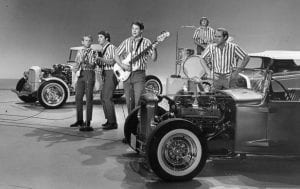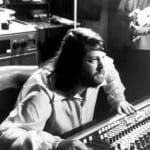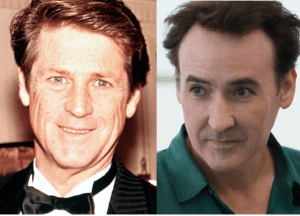Rarely does a movie get beneath my skin the way that the Brian Wilson biopic Love & Mercy did. As a child growing up in the 60s I preferred the American pop sound of the Beach Boys to the anglicized rock and roll of the Beatles. So I silently cheered when Paul Dano playing a young Brian Wilson urges his bandmates to outdo the recently released Rubber Soul: “We can’t let them get ahead of us. I can take us further.” The result was Pet Sounds, which Rolling Stone ranked the second greatest album of all time (after Sgt. Pepper’s Lonely Hearts Club Band, which was the Beatles response to the Beach Boys album).

Watching Love & Mercy, it occurred to me how Wilson’s life invites comparison with that of mathematician John Nash, the subject of the book and movie A Beautiful Mind. Both men were preeminent geniuses in their fields who peaked early before succumbing to severe psychotic disorders. Despite the phenomenal rise and devastating fall they experienced in youth, both men managed to come back from the brink of mental illness and relatively late in life were awarded the highest honors of their professions (a Nobel Prize for Nash and a couple of Grammys for Wilson). Their recovery, as depicted in the two movies, would seem to be owing to the influence (or love and mercy, so to speak) of the women in their lives.

In the Hollywood telling of these stories the wives are played by the improbably beautiful Jennifer Connelly and Elizabeth Banks. No doubt the real-life Alicia Nash and Melinda Wilson were important sources of comfort and support in their husbands’ recovery. However, I can’t help thinking that if you have schizophrenia and you’re not a world-class genius (and in Wilson’s case, very rich), the chances of a beautiful, understanding woman marrying (or in Nash’s case marrying, divorcing and remarrying) and caring you back to mental health are slight. For many people with serious psychotic disorders this caregiving and support role is taken up by parents, siblings, friends or peers, if it is taken up at all.
In both movies we see how supportive relationships greatly aid recovery. Less apparent are two other important ingredients of mental health recovery: treatment and work. John Nash claimed that he returned to sanity by force of will and logic, not by medication. But he also acknowledged that it was during his long involuntary hospitalizations that this logic was finally able to take hold for extended periods of time.
Some of the most powerful scenes in Love & Mercy are of Wilson being overmedicated, manipulated, and coerced into submission by his tyrannical Svengali-like therapist Eugene Landy, played by a frighteningly effective Paul Giamatti. The historical record shows that Landy took advantage of his famous patient, using him to live out his own fantasies of artistic acclaim and celebrity. But Wilson acknowledges that Landy was not just a therapist, but also a friend who helped him get out of bed and return to life at a time when everyone else had given up on him. It is quite possible that without Landy’s involvement Wilson may not have recovered and might just as easily have died an early tragic death like his brother Dennis.
In a 2006 interview Wilson was asked whether medication helped him to be more productive and creative by giving him relief from symptoms. He answered “Absolutely. I used to go for long periods without being able to do anything, but now I play every day.”
The other thing that saved him was his work. Medication helps. But it is not a cure-all for his symptoms. In the same interview Wilson describes how he copes with the voices that torment him every day of his life:
I dread the derogatory voices… They say things like, “You are going to die soon,” and I have to deal with those negative thoughts… When I’m on stage, I try to combat the voices by singing really loud. When I’m not on stage, I play my instruments all day, making music for people. Also, I kiss my wife and kiss my kids. I try to use love as much as possible.”
The book version of A Beautiful Mind similarly describes how Nash found solace and respite from his symptoms in his work.
The comeback stories of Brian Wilson and John Nash exemplify the three cornerstones of recovery: treatment, work (or other purposeful activity) and supportive relationships. The Hollywood versions of their lives focus more on the third and perhaps the most significant force for recovery, relationships. But closer examination of their lives reveals that treatment and their work were also of great significance.
With four Academy Awards, including Best Picture, and gross sales of more than $313 million, many would consider A Beautiful Mind the better movie of the two. I disagree.The overly literal depiction of Nash’s psychosis in the movie is not just ridiculous, it also serves to perpetuate old myths and stereotypes about mental illness. Russel Crowe received a Best Actor nomination for his portrayal of Nash, but it felt like he was playing the smart protagonist of a Hollywood movie, rather than the man himself. The same might be said of John Cusack playing the older Brian Wilson in Love & Mercy, although many people close to the former Beach Boy claim that Cusack’s performance is an accurate portrayal of Wilson at that stage of his life.

Paul Dano, who gained 35 pounds in preparation for the role, does an amazing job of bringing young Brian Wilson to life. The studio scenes depicting the making of the Pet Sounds album are masterful in every respect: costumes, sets, sound, and acting. The wonderful interplay between Dano’s intensely focused yet playful Brian Wilson and the skilled session musicians of the “Wrecking Crew” creates a feeling of intimate authenticity that enables us to share Brian’s passion in the studio. The Wrecking Crew played with everyone from Elvis and Bing Crosby to the Monkees, and they understand, even if the other Beach Boys don’t, that Wilson is on an almost holy quest to reinvent pop.
It’s been said that there’s a fine line between genius and insanity. Brian Wilson’s life gives that old cliché new vitality. In the movie we see how Wilson’s first brush with mental illness becomes the impetus for a dramatic turn in his life and music.
On a flight to Houston in 1964, Wilson experienced a terrifying panic attack, which led to his decision to stop touring with the band and focus on his songwriting and studio work. Many great performers have faded from the public eye following similar experiences (see Veronique’s recent post on Meg White of the White Stripes). Wilson dealt with the anxiety and the stress of live performance by taking to the studio to produce some of the greatest popular music of the 20th Century. Unfortunately, he also started using psychedelic drugs.
Wilson says he began hearing voices after his first experience with LSD. Eventually, he would be diagnosed with schizophrenia and bipolar disorder, before a final diagnosis of schizoaffective disorder was settled on. Love & Mercy tells two stories, one about the creation of a musical masterpiece, the other about Brian Wilson’s mental illness. The creation story may be more compelling from an artistic point of view, but the second story is most interesting for what it tells us about mental illness and recovery.
Love & Mercy had a limited run in theaters in June of 2015 and is now out on DVD. For anyone with an interest in popular music, 60s culture or mental health recovery, the movie is well worth seeing.
Click the link below for Beach Boys and Brian Wilson Trivia and Fun Facts:
Subscribe to our e-newsletter for more mental health and wellness articles like this one. Jay Boll, Editor-in-Chief
SUBSCRIBE NOW
Recommended for You







Thank you for bringing this movie to my attention; I hadn’t heard anything about it. I will definitely check it out on DVD. Though many films have attempted to depict mental illness, few seem to avoid stereotypes and even fewer attempt to tackle schizophrenia.
Thanks, Janice. I hope you like it.
This is one instance when Hollywood got it right. Part of the reason may be that the actors and director consulted closely with Brian Wilson and his wife during the making of the movie. Brian said that some of the performances were so real they frightened him.
Thanks to Jay for bringing this movie and history of Brian Wilson’s life to my attention. I, like many folks, had only heard bits and pieces of information about his illness. I especially liked when you wrote on the importance of love and relationships of others in the recovery of mental illness. Sadly, too few people know this.
Thank you for your comment, Mary Kate.
The complexity of Brian Wilson’s music is often overlooked because the feelings and ideas he expressed in his songs were so simple. Here are the last verse and chorus of “Love and Mercy,” which he wrote in 1988 after emerging from the worst phase of his illness….
I was standing in a bar
And watching all the people there
Oh, the loneliness in this world
Well it’s just not fair
Hey, love and mercy, that’s what we need tonight
So love and mercy to you and your friends tonight
Love and mercy, that’s what you need tonight
Love and mercy tonight
Love and mercy tonight
The song is a hymn to the healing power of relationships, which were such an important part of his recovery. I think that’s true for most people who struggle with serious mental health disorders.
Fighting jet lag, I popped “Love and Mercy” in – thinking light, fluffy movie – great. I was riveted and at the end standing up. The acting was incredible; I could visibly see the shift between two actors as one person;. I want to watch again for the bits I’m sure I missed.
You can rent it for just under a buck on iTunes. Watched it last night and really appreciated the work put into this movie.
Love and Mercy was a riveting movie about the depths of mental illness and the pain and mental illness caused by drug abuse AND an emotionally and physically abused childhood in the clutches of a terribly abusive childhood in a family where a mother also did NOT protect her children and get all of them away from a mean , critical abusive father who forced HIS dysfunction on his whole family and wanted to live vicariously through his sons . The LSD that Brian began consuming compounded his mental illness and caused apparently according to articles written, permanent brain damage. Dr. Eugene Landry was an abusive quack imo who caused more excessive damage to a brilliant but mentally ill man . I wish his family or those close to him , instead of thinking of Brian as a money machine, had searched for much better and helpful mental health professionals who could very well have helped him much sooner . Love and Mercy touched me deeply and also left me feeling very sad and very angry. Thank goodness Melinda came into his life and was able to recognize what Brian was suffering and help do something about it